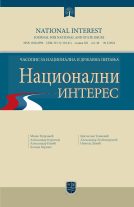- Home page
- Researchers
- Djordje Vuković
Djordje Vuković
Fakultet političkih nauka, Univerzitet u Banjoj Luci.

DAYTON, THE END OR RETURN OF POLITICAL BALANCE
The coronavirus pandemic that shook the world in early 2020 caught Bosnia and Herzegovina at the beginning of a sharp political and scientific debate on the need to revise the Dayton Peace Agreement on the one hand and its defense and affirmation on the other. On the eve of marking the 20th anniversary of the signing of an international treaty that halted the civil war in the central republic of the former Yugoslavia, Western diplomats, regional political leaders and experts raised the issue of the vitality of the Dayton Agreement, its functionality and the prospect of a state awaiting EU membership, burdened with old national antagonisms and the opposing political wills of the three constituent peoples of BiH. The author points to the dominant paradigms of interpreting the causes of the BiH political and social crisis, conflicts in the ways of its resolution and the dominant characteristics of political culture in a divided BiH society as an indispensable factor in understanding political processes. The author considers that the Dayton Agreement is not the cause of national, political, ethnic and cultural problems in BiH, but rather that it is a consequence of historical experience, traits of national characters, political mentality, culture of memory and, above all, political will of the three constituent peoples. The protection of collective rights and freedoms in BiH is not a threat to individuals and minorities, but neither as "ethnic divisions" and "nationalist aspirations". Constitutional positioning of constituent peoples (what was once considered the "national key") in BiH is not a transitional solution to a state of "one man - one vote", but the only basis on which peace can be preserved and a common life built.
